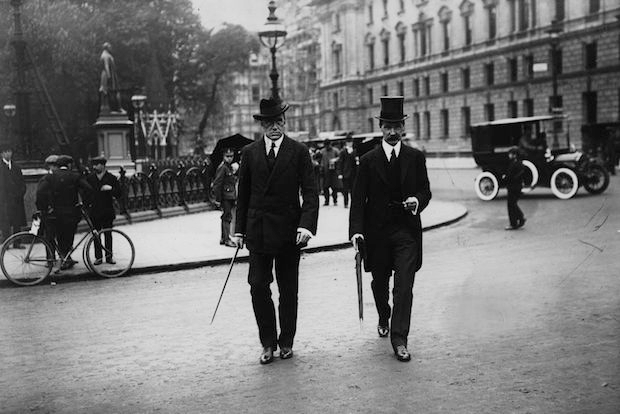From ‘The Defence of the Realm’, The Spectator, 13 March 1915:
BEFORE dealing with the merits of the Defence of the Realm (No. 2) Bill which Mr. Lloyd George introduced into the House of Commons on Tuesday, it is necessary to say a few words about the manner of the introduction. This is a measure which Mr. Bonar Law, whose power of effective criticism seems to grow each week, accurately described as one of the most drastic proposal ever laid before Parliament. It is, in brief, a proposal to authorize the Government to take over any factory or workshop that they think they may want for the production of war material or any unoccupied building they want for the housing of workmen. Obviously such a measure as this, which places a large portion of the property of private citizens at the absolute disposal of the Government ought to be carefully considered by the House of Commons, how- ever much need there may be for haste.
Yet Mr. Lloyd George in the first instance asked the House to pass the Bill through all its stages before it had even been printed. The delay involved in printing the Bill was at most a matter of a few hours, and there could be no reason whatever for failing to carry out the ordinary practice of having the Bill introduced on one day and printed and submitted to the House the next day. This indeed is the course which under pressure from the House the Chancellor of the Exchequer finally agreed to, thus regularizing Parliamentary procedure. Our whole present protest is directed, not against what was actually done, but against what the Chancellor of the Exchequer. presumably backed by the Cabinet, proposed to do. It is an example of the mischief which ensues when Governments are relieved from the fear of criticism.
There is a certainty that the Socialists among us will appeal to this extraordinary example of Government activity and try to convert present emergency war measures into a precedent for the permanent State organization of industry in times of peace. Already we have seen a good deal of evidence of this desire to make Socialistic hay while the sun shines. Mr. Chiozza Money, who in many ways is one of the most clear-headed members of the Liberal Party, persistently tries to persuade the country that the Government are now managing all the railways, and that this is a proof that Government ownership of railways would be desirable as a permanent institution. As a matter of fact, the Government are not managing the railways. All they are doing is to exercise through the existing management a power of control over the traffic so that the military needs of the nation may have priority. They also have a financial arrangement with the companies to secure them against loss, and apparently that arrangement is a profitable one to the companies. The principal extension of Government powers now proposed is undertaken in the same spirit—namely, to secure priority for the essential military needs of the country. Such a step has absolutely no relevance to the main Socialistic conception of the permanent control of the industries of the nation by the Government. Nor does it give any justification for such partial experiments in Socialism as State management of railways, or even State management of the telephone service. The essential distinction is that in the one case State control is desirable in order to secure the output of the necessary material at any cost; in the other case State management is advocated as a means of securing greater efficiency in production, greater wages to the workpeople, and greater profit to the nation. It is here that the non-Socialist joins issue with the Socialist. Up to date all experience that the world has had of Government management shows that such management tends to be more wasteful and less efficient than private management. In particular cases there may be countervailing considerations.
For example, it might in the case of the telephone service be desirable to put up with the relative inefficiency of State management in order to secure a unity of control in the public interest. Our own view strongly is that in this particular case the unity of control could be more profitably secured by means of an independent company acting under Government supervision. That, how- ever, is a question that has to be debated on its merits. Our whole point for the present is that experience derived from emergency war measures is no guide whatever to the solution of the question whether the telephones of the country should be directly managed by the State or whether they should be managed by a private company under State control.






Comments